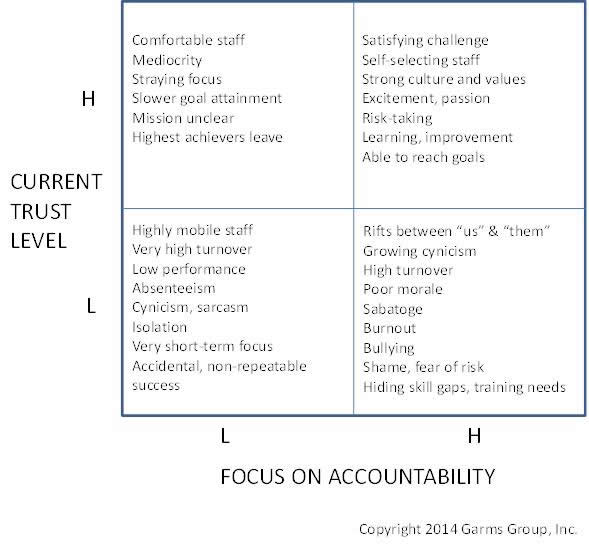ATD Blog
Book Giveaway: Trust Precedes Accountability—Do Your Employees Trust You?
Thu Mar 26 2015

Congratulations to Lori Arthur-Carmichael, the winner of the book giveaway! Please email Ann Parker at [email protected] with the best mailing address to which ATD can send your free copy of The Brain-Friendly Workplace.
What do you mean when you use the phrase, “holding accountable?” What do you suspect others in your organization mean when they use this term?
“Accountability” in its most complete sense refers to:
responsibility
transparency
trustworthiness
participation
feedback
measurement of results
How many of these descriptions match your conception of the term? I suspect that most of the time we hear and use this term, we do not intend all six aspects of this definition; instead we are referring to simply holding someone responsible for her actions. This interpretation allows the impression that closer monitoring of employee activity and retribution for poor performance are the keys to a strong workforce. And although these behaviors may be necessary for building a strong workforce, they are not sufficient.
Accountability cannot be demanded. It is earned. Accountability should not be the initiative, the leadership mantra, or the training topic. It is the result of a sane, respectful, and high-performing workplace where human needs are met.
As research from such thought leaders as Daniel Pink and David Rock has shown, feeling a sense of autonomy about our work is a primary human need and motivator. Well-intentioned but misdirected efforts to squeeze more accountability out of staff directly threatens this need.
We are innately sensitive to both inequality and status differences within social groups (like the workplace). When organizational superiors—who may not be well-informed about the work employees do—make demands about performance, communication and trust can become strained. If managers are not collaborative, encouraging, appropriately challenging, or even respectful, our heightened sensitivity to status and threat will further widen this management-employee chasm. Social connectedness is also critically important to individual and organizational success. Demanding greater accountability without first building strong social bonds is a risky proposition, more likely to backfire than to bring success.
The following chart shows descriptors of workplace cultures on the spectrum from high trust to low trust and high focus on accountability to low focus on accountability.

As you can see, a high focus on accountability with high trust is the sweet spot for employee engagement and the “brain-friendliest” work environment.
When managers walk their talk and espoused values are reinforced and not contradicted, then accountability grows organically and is intrinsic. It does not need to be externally incented because employees are energized about working for shared goals and results.
Lack of congruence between an organization’s (or individual manager’s) stated values and observable behaviors builds confusion. Think about misalignment and low trust as a foot on an engaged brake pedal in a car. Fully engaging the gas pedal simultaneously will not propel your group or company forward successfully. Rather, the wheels will spin and the car may sustain damage. You must let off of the brakes to move forward effectively. Likewise, engagement will be allowed to thrive once congruence between values and behaviors is realized. When human needs are acknowledged and built into the systems, processes, and practices of a workplace, a true “brain-friendly” organization can emerge.
Moving forward
It is risky to exert too much pressure on accountability too soon, to the detriment of reaching your organizational goals. But is it possible to put too great a focus on building trust in the workplace? Is there any danger in focusing on trust-building as a foundation, before launching an accountability campaign? Wouldn’t it be intriguing to have an organization-wide conversation about the interaction between accountability and trust in your workplace?
How are you engaged in trust-building and/or accountability-holding in your organization?
Answer this question in the comment section below for a chance to win a free copy of The Brain-Friendly Workplace. Your comment must be received by 5 p.m. EDT on Friday, April 3, and you must include your email address. If you prefer to email your response, please send it to [email protected]. We will select and announce a winner in this post by Wednesday, April 8.
You've Reached ATD Member-only Content
Become an ATD member to continue
Already a member?Sign In
